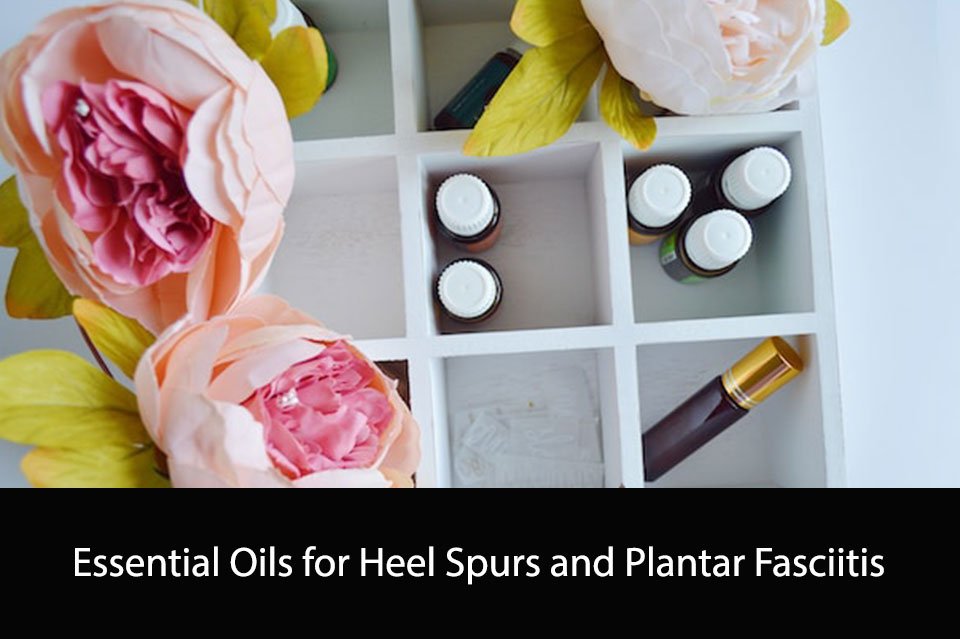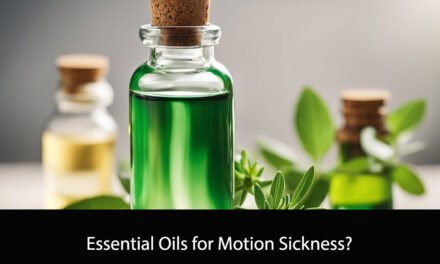Essential oils have been used for centuries to treat a variety of ailments, including heel spurs and plantar fasciitis. These conditions can cause significant pain and discomfort, making it difficult to walk or stand for extended periods. While traditional treatments such as physical therapy and medication can be effective, essential oils offer a natural and holistic approach to managing symptoms.
One of the most effective essential oils for heel spurs and plantar fasciitis is peppermint oil. This oil contains menthol, which has a cooling and soothing effect on the affected area. Peppermint oil can help reduce inflammation and pain, making it an excellent choice for those experiencing heel pain.
Another essential oil that can be helpful for these conditions is lavender oil. Lavender has anti-inflammatory properties and can help reduce pain and swelling. It also has a calming effect, which can help alleviate stress and tension that may be contributing to the pain. When used in combination with other essential oils, lavender can be a powerful tool in managing heel spurs and plantar fasciitis.

Understanding Heel Spurs and Plantar Fasciitis
Heel spurs and plantar fasciitis are common foot conditions that can cause pain and discomfort, particularly in the heel area. It is important to understand the causes and symptoms of these conditions in order to effectively manage and treat them.
Heel Spurs
Heel spurs are bony growths that form on the heel bone, usually as a result of long-term strain on the ligaments and muscles of the foot. They can cause pain and tenderness in the heel, particularly when walking or standing for long periods of time.
Some common causes of heel spurs include:
- Wearing poorly fitting shoes
- Being overweight or obese
- Having high arches or flat feet
- Participating in activities that put a lot of stress on the feet, such as running or jumping
Plantar Fasciitis
Plantar fasciitis is a condition that occurs when the plantar fascia, a thick band of tissue that runs along the bottom of the foot, becomes inflamed. This can cause pain and stiffness in the heel and arch of the foot, particularly when first getting out of bed in the morning.
Some common causes of plantar fasciitis include:
- Overuse or repetitive strain on the foot
- Being overweight or obese
- Having high arches or flat feet
- Wearing shoes with poor arch support or cushioning
In summary, heel spurs and plantar fasciitis are common foot conditions that can cause pain and discomfort. Understanding the causes and symptoms of these conditions is an important step in effectively managing and treating them.
Essential Oils: An Overview
When it comes to treating heel spurs and plantar fasciitis, essential oils can be a natural and effective option. Essential oils are highly concentrated plant extracts that contain the natural fragrance and properties of the plant.
There are many different essential oils that can be used to help alleviate the pain and inflammation associated with heel spurs and plantar fasciitis. Some of the most commonly used essential oils include:
- Peppermint oil: Known for its cooling and soothing properties, peppermint oil can help to reduce inflammation and alleviate pain.
- Lavender oil: This oil is known for its calming and relaxing properties, and can help to reduce stress and tension in the feet.
- Eucalyptus oil: With its anti-inflammatory properties, eucalyptus oil can help to reduce swelling and pain.
- Rosemary oil: This oil has analgesic and anti-inflammatory properties, making it a great option for reducing pain and inflammation.
When using essential oils, it’s important to dilute them properly before applying them to the skin. This can be done by mixing a few drops of the essential oil with a carrier oil, such as coconut oil or jojoba oil.
It’s also important to note that essential oils should not be ingested, as they can be toxic if consumed. Additionally, some essential oils may cause skin irritation or allergic reactions in some individuals, so it’s important to test a small area of skin before applying the oil to a larger area.
Overall, essential oils can be a natural and effective option for treating heel spurs and plantar fasciitis. By using the right oils and diluting them properly, you can help to reduce pain and inflammation in your feet.
How Essential Oils Can Help
Essential oils have been used for centuries for their therapeutic properties. They are made from natural plant extracts and have been found to be effective in treating a variety of ailments, including heel spurs and plantar fasciitis. In this section, we will explore how essential oils can help with these conditions.
Essential oils are highly concentrated and potent, and they can be used in a variety of ways to help alleviate pain and inflammation associated with heel spurs and plantar fasciitis. They can be applied topically, inhaled, or ingested, depending on the oil and the individual’s preferences.
When applied topically, essential oils can penetrate the skin and enter the bloodstream, where they can help to reduce inflammation and pain. Some of the best essential oils for heel spurs and plantar fasciitis include:
- Peppermint oil: This oil has a cooling effect and can help to reduce pain and inflammation.
- Lavender oil: This oil has anti-inflammatory properties and can help to reduce swelling and promote healing.
- Eucalyptus oil: This oil has a warming effect and can help to increase circulation and reduce pain.
Inhaling essential oils can also be beneficial for those with heel spurs and plantar fasciitis. Aromatherapy is a popular way to use essential oils and can help to reduce stress and promote relaxation. Some of the best essential oils for aromatherapy include:
- Frankincense oil: This oil has a calming effect and can help to reduce stress and anxiety.
- Bergamot oil: This oil has a refreshing scent and can help to uplift the mood.
- Lemon oil: This oil has a bright and citrusy scent and can help to improve focus and concentration.
Ingesting essential oils is another way to benefit from their therapeutic properties. However, it is important to note that not all essential oils are safe for internal use, and it is essential to consult with a healthcare professional before ingesting any essential oils. Some of the best essential oils for internal use include:
- Ginger oil: This oil has anti-inflammatory properties and can help to reduce pain and swelling.
- Turmeric oil: This oil has antioxidant properties and can help to reduce inflammation and pain.
In conclusion, essential oils can be an effective and natural way to help alleviate pain and inflammation associated with heel spurs and plantar fasciitis. However, it is essential to use them safely and consult with a healthcare professional before use.

Essential Oils for Heel Spurs
If you’re looking for a natural way to relieve the pain caused by heel spurs, essential oils may be a good option for you. Here are some of the most effective essential oils for heel spurs and plantar fasciitis:
Lavender Oil
Lavender oil is known for its calming and relaxing properties, but it can also help reduce inflammation and pain caused by heel spurs. This essential oil can be applied topically to the affected area, or added to a warm foot bath for a soothing and therapeutic effect.
Peppermint Oil
Peppermint oil is a natural pain reliever and anti-inflammatory agent, making it an excellent choice for treating heel spurs. This essential oil can be diluted with a carrier oil and applied topically to the affected area, or added to a foot soak for a cooling and refreshing sensation.
Eucalyptus Oil
Eucalyptus oil is another powerful anti-inflammatory agent that can help relieve pain and inflammation caused by heel spurs. This essential oil can be applied topically to the affected area, or added to a warm foot bath to help soothe and relax sore muscles.
When using essential oils to treat heel spurs, it’s important to dilute them properly with a carrier oil to avoid skin irritation. Always do a patch test before using any new essential oil, and consult with a healthcare professional if you have any concerns or questions.
Essential Oils for Plantar Fasciitis
Plantar fasciitis is a common condition that causes pain in the heel or arch of the foot. Essential oils can be a natural way to help manage the symptoms of plantar fasciitis. In this section, we will discuss some of the most effective essential oils for plantar fasciitis.
Frankincense Oil
Frankincense oil is a popular essential oil that has been used for centuries for its healing properties. It has anti-inflammatory and analgesic properties that can help reduce pain and inflammation associated with plantar fasciitis. To use frankincense oil, mix a few drops with a carrier oil such as coconut oil or almond oil and massage onto the affected area.
Rosemary Oil
Rosemary oil is another essential oil that has anti-inflammatory properties. It can help reduce pain and swelling associated with plantar fasciitis. To use rosemary oil, mix a few drops with a carrier oil and massage onto the affected area. You can also add a few drops to a warm foot bath for added relief.
Chamomile Oil
Chamomile oil is a gentle essential oil that has anti-inflammatory and analgesic properties. It can help reduce pain and inflammation associated with plantar fasciitis. To use chamomile oil, mix a few drops with a carrier oil and massage onto the affected area. You can also add a few drops to a warm foot bath for added relief.
Overall, essential oils can be a natural way to help manage the symptoms of plantar fasciitis. However, it is important to use them properly and in conjunction with other treatments recommended by your healthcare provider.
How to Apply Essential Oils
When it comes to using essential oils for heel spurs and plantar fasciitis, it’s important to know how to apply them properly in order to get the most benefit. Here are some tips for using essential oils effectively:
- Dilute the oils: Essential oils are highly concentrated and can be irritating to the skin if used undiluted. We recommend diluting them with a carrier oil, such as coconut or almond oil, before applying them to the affected area. A good rule of thumb is to use 1-2 drops of essential oil per teaspoon of carrier oil.
- Apply to the affected area: Massage the diluted essential oil onto the heel or arch of the foot, paying special attention to the area where the pain is located. Use gentle, circular motions to help the oil penetrate the skin and provide relief.
- Use regularly: Essential oils are most effective when used consistently over time. We recommend applying them 2-3 times per day, or as needed, for best results.
- Choose the right oils: Some essential oils are more effective than others for treating heel spurs and plantar fasciitis. We recommend using oils such as peppermint, lavender, eucalyptus, and frankincense, which have anti-inflammatory and pain-relieving properties.
- Be patient: Essential oils are a natural remedy and may take some time to provide relief. We recommend using them consistently for at least 2-3 weeks before expecting to see significant results.
By following these tips, you can effectively use essential oils to treat heel spurs and plantar fasciitis. Remember to always dilute the oils and choose the right ones for your needs. With regular use, you can experience the benefits of natural pain relief and improved mobility.
Safety Precautions for Using Essential Oils
When using essential oils for heel spurs and plantar fasciitis, it is important to take certain safety precautions to avoid any adverse effects.
Firstly, it is important to always dilute essential oils before use. Essential oils are highly concentrated and can cause skin irritation or even burns if applied undiluted. We recommend diluting essential oils in a carrier oil such as coconut oil, almond oil, or jojoba oil.
Secondly, it is important to perform a patch test before using any essential oil. Apply a small amount of diluted essential oil to a small area of skin and wait for 24 hours to see if there is any reaction. If there is any redness, itching, or irritation, do not use the oil.
Thirdly, some essential oils are not safe for use during pregnancy or for individuals with certain medical conditions. It is important to consult with a healthcare professional before using essential oils if you are pregnant or have any medical conditions.
Fourthly, essential oils should never be ingested unless under the guidance of a healthcare professional. Ingesting essential oils can be toxic and cause serious health problems.
Lastly, always store essential oils in a cool, dry place away from direct sunlight. Essential oils can degrade when exposed to heat and light, which can reduce their effectiveness and potentially cause adverse effects.
By following these safety precautions, you can safely and effectively use essential oils to help alleviate heel spurs and plantar fasciitis.
Conclusion
In conclusion, essential oils can be a useful addition to a treatment plan for heel spurs and plantar fasciitis. While there is limited scientific evidence to support their effectiveness, many people have reported positive results from using these oils.
When using essential oils for heel spurs and plantar fasciitis, it is important to remember that they should not be used as a substitute for medical treatment. If you are experiencing foot pain, it is important to consult with a healthcare professional to determine the underlying cause and develop an appropriate treatment plan.
If you do choose to use essential oils, it is important to use them safely and effectively. Always dilute essential oils with a carrier oil before applying to the skin, and avoid using them on open wounds or broken skin. It is also important to be aware of any potential allergies or sensitivities to essential oils.
Overall, essential oils can be a helpful tool in managing foot pain, but they should be used in conjunction with other treatments and under the guidance of a healthcare professional. With the right approach, essential oils can provide a natural and effective way to support the healing process and promote overall foot health.

Frequently Asked Questions
What essential oil is good for heel spurs?
There are several essential oils that can help alleviate the pain caused by heel spurs. Some of the best essential oils for heel spurs include peppermint oil, frankincense oil, and lavender oil. These oils have anti-inflammatory properties that can help reduce swelling and pain in the affected area.
What essential oil is best for plantar fasciitis?
Plantar fasciitis is a painful condition that affects the bottom of the foot. Essential oils such as peppermint oil, eucalyptus oil, and ginger oil can help reduce inflammation and pain associated with plantar fasciitis. These oils can be used topically or diffused to help alleviate symptoms.
What is the best oil for heel spur massage?
Massage can be an effective way to help reduce pain and inflammation caused by heel spurs. Essential oils such as peppermint oil, frankincense oil, and lavender oil can be mixed with a carrier oil such as coconut oil or jojoba oil to create a massage oil that can be applied to the affected area.
How do you get rid of heel spurs fast?
Heel spurs can be a painful and frustrating condition to deal with. While there is no quick fix for heel spurs, there are several things you can do to help alleviate symptoms. Some of these include rest, ice, stretching, and wearing supportive shoes. Essential oils such as peppermint oil, frankincense oil, and lavender oil can also help reduce pain and inflammation.
What are some natural remedies for plantar fasciitis?
In addition to essential oils, there are several natural remedies that can help alleviate symptoms of plantar fasciitis. These include stretching exercises, wearing supportive shoes, using ice packs, and taking over-the-counter pain relievers such as ibuprofen.
Can essential oils help with foot pain?
Yes, essential oils can be an effective way to help alleviate foot pain. Peppermint oil, eucalyptus oil, and ginger oil are just a few examples of essential oils that can help reduce inflammation and pain in the feet. It is important to dilute essential oils with a carrier oil before applying them topically to avoid skin irritation.





